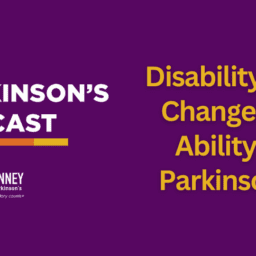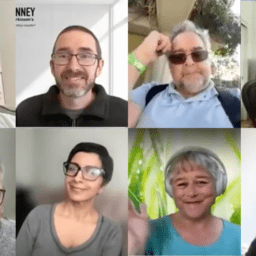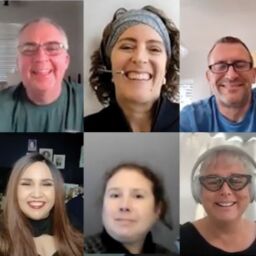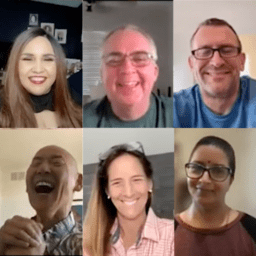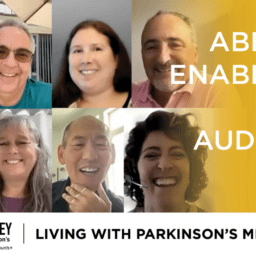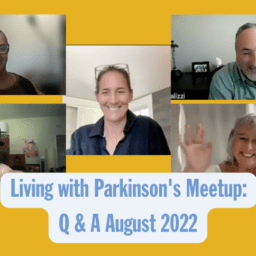This month, the Living with Parkinson’s Meetup panelists discussed how Parkinson’s has changed their abilities, getting disability benefits, and how they have approached these changes.
This topic is extensive, and the panelists discussed many issues, including driving, stigmatization, leaving work, applying for disability benefits in the US, and global health disparities.
If you’d like a copy of the transcript, you can download it here.
If you’d like a copy of the audio, you can download it here.
Show Notes
Acknowledgment of Disability: Impacts on Access to Support
Acknowledging when your abilities have changed is critical to living well with Parkinson’s. A challenge is that your abilities often differ from minute to minute.
For example, Kristi observed that she may be able to walk into a grocery store but can’t be sure she’ll be able to walk out 10 minutes later. This contributes to a feeling like an imposter when using a handicapped hangtag in parking lots, or a wheelchair to navigate the airport.
It is essential to keep in mind that early in your time living with Parkinson’s, you may find yourself thinking, “I’m okay, I can do this,” about any given activity. And you may be right. The challenge is to pay careful attention to when it is time for you to take advantage of extra support or make changes to your activities.
Feeling like an Imposter
Some panelists expressed concern about feeling like an imposter when using resources for the disabled community because their Parkinson’s symptoms may be hard for others to see. For example, it can feel embarrassing or inappropriate to take a wheelchair around an airport or to pre-board your flight but you’re able to move well when you get out of the wheelchair. Notably, these concerns can also arise with other more dynamic activities like using an electric assist bike on a group ride.
In thinking about situations like these, many panelists thought it was more important to make use of available support than to risk being unable to effectively live your life. For one thing, the stress of not taking the wheelchair at the airport might worsen symptoms, making you miss your flight or, even worse, fall and become injured.
Representing the Tribe
Kevin brought up the idea that one way to free oneself from imposter syndrome or to navigate the stigma associated with taking extra support is to view these moments as opportunities to educate others and spread awareness about Parkinson’s.
For example, if you park in an accessible parking spot and get out of the car able to move relatively well, you might talk with people who see you and proactively say to them what you feel about using the spot while your symptoms are well-controlled. This allows you to share that Parkinson’s makes it impossible to know what the next 10 minutes will look like relative to your abilities.
Doing this every time you get out of the car is emotionally and practically difficult, but having this tactic available—and being comfortable using it—can help ease the difficulties of feeling like an imposter when using extra support. Doug shared that when he uses a wheelchair, he tries to wear a Davis Phinney Foundation shirt. This helps inform people of why he uses the resource without explaining himself.
A viewer expressed a more radical view of responding to feeling like an imposter. She wrote, “What other people think of us is none of our business.” Some on the panel found this particularly strong advice.
Thoughts on Applying for Disability
The panelists also discussed difficulties and tips related to applying for disability.
Kevin discussed his experience with a Functional Capacity Evaluation, and he observed that after it was complete, the person who performed the evaluation said Kevin was disabled according to the evaluator’s definition. The critical point is that being disabled for work doesn’t mean being unable to be a full, rich, and significant contributor to a community or society overall.
The Mixed Blessing of Being Approved for Governmental Disability Support
Multiple members of the panel expressed that having their application for disability benefits accepted was an important moment but that it was also one of the most challenging days of their lives.
It is challenging to be told you can no longer do work that you loved to do. The difficulty can be even more intense if you deeply identified with your work or the community associated with your profession.
Tom associated this complicated reaction with a grieving process. He also observed that thinking of the disability application as a business decision was helpful for him.
Other Tips Regarding Governmental Disability Benefits
- Consider attending workshops and other informational sessions in your community or online that can help you understand the application process.
- Believe that you will know when the time is right to start the formal application process.
- Hire a lawyer if you can afford to do so. The process is very complicated and denials are common. Some lawyers specialize in the process.
Disability and Parkinson’s Around the World
The panelists also discussed that disability associated with Parkinson’s is experienced differently worldwide.
To highlight an example of these differences, Kat and Kevin brought up the film Shaking Hands With The Devil, which was featured at the 2024 World Parkinson Congress. This short film discusses the experience of living with Parkinson’s in Kenya, where access to Parkinson’s medications is very limited or non-existent, and people with Parkinson’s experience extreme stigmatization—issues that can result in people feeling socially isolated and even afraid to leave their homes.
This is just one example of how disabling Parkinson’s can be, and the challenges are different for people in different locations. What is common to all people with Parkinson’s is that changing abilities—and ultimately the disability—caused by Parkinson’s touches all parts of life: physical, social, emotional, and spiritual.
Living Well with Changing Abilities
Despite the far-reaching effects of Parkinson’s, you can live well with it, even as your abilities change.
The details of what you accomplish will be different depending on your circumstances. Still, the key aspects of living well will be similar: You must pay attention to the changes you experience, be open with your care team about those changes, educate yourself about the resources available in your community, and try to remain flexible to adapt to the changes you face–today and in the future.
Additional Resources
Join Us for Care Partner Training
Nexus Letter from the Veterans Law Group
Davis Phinney Foundation’s Grief Tag
Accepting Limits and Living with Parkinson’s
Social Security Administration Recognizes Non-Motor Symptoms of Parkinson’s Disease
Wheelchair and Guided Assistance from the Department of Transportation
Davis Phinney Foundation’s Travel Tag
WANT MORE PRACTICAL RESOURCES LIKE THIS?
You can learn much more about living well with Parkinson’s today through our Every Victory Counts® suite of resources. Each manual is packed with up-to-date information about everything Parkinson’s. Click the link below to order your manual(s).
Thank you to our 2023 Peak Partners, AbbVie, Amneal, and Kyowa Kirin, and our Every Victory Counts Gold Sponsor, AbbVie Grants, for their ongoing support of these must-have manuals. Additionally, we’d like to thank Barbara and Dale Ankenman, Abby and Ken Dawkins, Bonnie Gibbons, Gail Gitin in loving memory of Gene Gitin, Irwin Narter, and Lorraine and J Wilson for their generous donations that allow us to make these resources available and free to all.
To receive our electronic newsletter and other updates, sign up now



